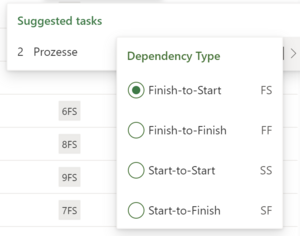Microsoft Project for the Web (Project Plan 1), available since 2019, offers an additional Microsoft 365 cloud service for planning projects and tasks – in addition to Project Online and Planner. This new service is targeted at users involved in collaborative work management who plan simple rather than complex projects.
The price of Project for the Web (Project Plan 1) is $10 / €9.40 per month (source: Microsoft). If you already have a Project Plan 3 (previously Project Online Professional) or Project Plan 5 (previously Project Online Premium) license, the new service is available at no extra cost.
With the Project for the Web Accelerator / PPM for Power Apps Accelerator, Microsoft provides a free enhancement, e.g. for program management. More detail at the bottom of the page.
In the initial version, Microsoft Project for the Web (Plan 1) started with an easy-to-use range of functions. This has been expanded continuously over the last few years. The functional scope was designed to enable a future migration from Project Online to Project Plan 1. Until then, Microsoft recommends using both products in parallel based on the projects’ complexity.
Microsoft is continuously developing the new cloud tool (roadmap of planned changes).
Limitations in comparison with other tools such as Project for the Web Accelerator, Project Online or TPG ProjectPowerPack are shown in the table below.
In the current version (July 2023), Project for the Web supports the areas of scheduling with a traditional waterfall model, agile working methods with Boards and Sprint planning as well as project tracking and the allocation of high-level goals to projects and tasks.

There is comprehensive scheduling with different types of links in the standard version, yet no intervals. The critical path can be presented in the same way as in Project Online, but it requires a higher license (Project Plan 3).
Up to 10 custom fields per project can be created. For instance, the following field types are available: Text, date, number (decimal), Rollup possible (with additional information), Yes / No, selection field.
Baselines and costs are not yet available.
An app for time tracking is also still missing.
Planner Premium offers a nice mix of traditional and agile best practices. The Timeline view displays a Gantt chart and the Board shows all tasks as cards with status and additional information.
One of the key advantages of the new service compared to Project Online is the ability to work together on a project plan, which is referred to as “co-authoring”.
Carefully delegating parts of the plan to individuals can simplify the planning work. All members of the Microsoft 365 group belonging to a project may edit the schedule simultaneously. Changes by other users are shown immediately. This allows for teamwork while building the schedule.
Integration with Microsoft Teams is easy, as there is a web address for each project which can be displayed as a tab in a Channel in Teams.
The resources in Planner Premium are derived from a new or existing group in Microsoft 365 Groups. There is no resource pool for cross-project planning as in Project Online, but it is possible to add additional data to resources, such as availability or department. It is not possible to plan the cost of resources or direct costs.
If several people are assigned to a task, it is possible to differentiate via the “Assignments” view who is responsible for completing each part.

Unlike Project Online, Planner Premium is not based on SharePoint but rather on Microsoft 365 Groups and the Dataverse database (formerly CDS). This provides users with a platform that can be extensively adapted to their individual requirements using Power Apps, Power BI and Power Automate. New tables such as risks, issues and other lists can be created and analyzed in connection with the new service’s projects and tasks.
However, you will need separate licenses to edit and use Power Apps and Power BI and Power Automate making this option considerably more expensive.
In Planner Premium, the following limits are sufficient for small to medium-sized projects and should not be a problem for simple use cases:
Microsoft offers a free report pack for Power BI with a number of useful reports. Some of them display portfolio level information across all projects.
Project Online will be available and maintained in terms of security and performance. Microsoft says that it will continue to fully support it.
Users can therefore rest assured that their investment is safe and continue to use Project Online with all its functions for company-wide project and portfolio management in building their environment.
For local installations, standard support for Microsoft Project Server 2019 will remain available until September 1, 2024, and extended support until July 14, 2026. As the “Subscription Edition” of SharePoint Server, which has been available since 2022, continues to include Project Server, its use in a company’s own infrastructure is also secured for the future.
The projects from Project Online and Planner Premium can be accessed via Project Home and can be jointly analyzed in Project Roadmap and via Power BI.
There are currently no plans to integrate it with Project Desktop Client. However, Microsoft wants to integrate the features that are most frequently requested in User Voice. So, this integration may happen someday after all.
Planner Premium offers an easy and attractive entry to the world of classic project planning in combination with agile work management. It offers a timeline with linked tasks and a board view – a combination that makes a lot of sense in terms of usability and acceptance. The possibility to work in parallel on the same project is highly welcomed by users from agile methods.
So, if all you want to accomplish is simple scheduling for a small team and you don’t need any resource management features, timesheets and such, it should be sufficient for your needs. We look forward to seeing which functions Microsoft will implement next.
PPM for Power Apps Accelerator is a free enhancement for Project for the Web. It is a preconfigured Power Apps instance opening up the following additional possibilities:
If required (provided the necessary know-how is available), the solution can be adapted and enhanced to meet individual requirements. An enhancement of this kind with many additional features is TPG ProjectPowerPack.
Compared to Project Online, PPM for Power Apps Accelerator still has a lot of limitations (e.g. a maximum of 1,000 tasks, missing baselines, etc.).

Would you like a free personal online consultation with a TPG expert to find out how you can take your multi-project / program management to the next level? Together we will talk about your questions, requirements and possible next steps – no costs for you!
Please click on the "Contact us now" button below and the contact form will open. Submit the form and we will get back to you as soon as possible with a proposed date for your free online consultation.